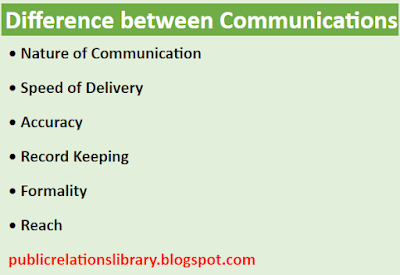Introduction:
Communication is an essential aspect of daily life, and it helps to convey
messages and ideas from one person to another. There are various forms of
communication, including oral and written communication.

- Nature of Communication: Oral communication
is a verbal form of communication that involves speaking, while written
communication involves reading and writing. Oral communication is
typically more personal and spontaneous, while written communication is
more formal and structured.
- Speed of Delivery: Oral communication is
generally faster than written communication, as messages can be conveyed
quickly through conversation. Written communication takes longer to
prepare, as it involves writing and editing the message.
- Accuracy: Written communication is considered
more accurate than oral communication, as it provides a permanent record
of the message and allows for review and editing. Oral communication, on
the other hand, can lead to misinterpretation and miscommunication due to
its informal and spontaneous nature.
- Record Keeping: Written communication
provides a permanent record of the message, while oral communication does
not. This makes written communication more suitable for legal and official
purposes.
- Formality: Written communication is generally
more formal than oral communication, as it involves the use of proper
grammar, spelling, and punctuation. Oral communication is typically more
informal and may involve slang or colloquial language.
- Reach: Oral communication is limited to those
present in the conversation, while written communication can be shared
with a wider audience through various means, such as emails, letters, or
reports.
Conclusion: Both oral and
written communication have their advantages and disadvantages, and it is
important to choose the right form of communication for the purpose and
audience. The best approach is to use a combination of both, as each form of
communication has its unique strengths and weaknesses.